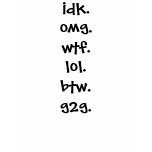 |
| Who cares about his genocidal warmongering? Look at that terrible conjugation! |
 |
| In fact...no. Just no. |
4. "Y" is Not the Only "Sometimes" Vowel
The letter 'Y' is a tricky little bastard. Sometimes, like in "Very," it acts like a vowel and creates an "E" sound. Sometimes, as in "Young," it acts as a consonant with the harder "Yuh" sound. Y is the gender-bending hermaphrodite of the alphabet and is listed as an afterthought in the catalog of vowels.
| "Sure, sailor, I swing both ways...for a price." |
In this case that just isn't true. Written English has no real rules, just desperate attempts at rules, like a substitute teacher in a 5th grade classroom after recess. Words like "union" and "university" are actually employing the "yuh" sound from the letter Y, and "once" is borrowing heavily from W and acting like he'll pay it back even though he won't.
This is the fault of written English being a stuck-up bitch. It's time to just say things out loud before we write them down and to feel okay about doing that.
3. "Nother" is Totes a Word
The English language is constantly changing to keep up with slang. "Ginormous" recently made it into the dictionary just because people were enjoying playing Frankenstein with our standard lexicon. That's a fine thing to do. Lewis Carroll made up the word "Slithy" to be a cross between "Lithe" and "Slimy" and it totally worked for him.
 |
| All that acid helped, too. |
 |
| "My day has come." |
I would not have thought of it at all, except that I found myself, as so many of us do, writing out the transcript of the movie "Star Wars." (Because, as I believe I have stated previously, shut up, that's why.) In said movie, there's a moment where Luke is whining to his uncle like the little bitch that he is. His uncle asks him to stay on the farm for an additional season to help with the harvest.
 |
| "You know. So we don't die of thirst in this never-ending, godforsaken desert." |
Which got me to thinking. Technically this word is "a-whole-nother." The word "another" is broken up by the word "whole." But that's not really what it is. It's "a whole year" and the word "nother" is giving it emphasis. I vote that we embrace this curious little quirk. Let's make "nother" a word. We want to. We're not saying "An-whole-other year." We already use it when we say "That's another thing." What we should be saying is "That's an other thing," but with spoken English it sounds like "That's a nother thing." So screw it. Let's just say that "nother" means "additional" and be done with it.
2. Let's Decide Right Now How "H" is Pronounced
Quick lesson about pronouncing words that start with "H." If the first syllable is emphasized, you would use the word "a" before it. If it's the second syllable, you write "an." For instance, you write a history, but you also write an historical account. A history. An historical account. A hospital. An hospitable environment. Etc.
Oh, but if the "H" is silent then the word is "an" no matter where the emphasis falls. So it would be an honor. To stop talking about this now. Got it?
 |
| Good. |
 |
| Assuming anyone can even spell "historical" anymore. |
1. You Can End a Sentence With a Preposition (Seriously)
Douchebag trollers and pedantic college freshmen will tell you that you can't end a sentence with a preposition. This is any word that relates to space and time. So "with," "up," "about," "since," etc. While you might feel totally comfortable saying, "Who are you going with?" or "I wish you'd lay off," many people insist that this is incorrect. A lot of people won't write it that way, just in case. They'll write "Under what were you sitting?" or "By whom was the book written?"
Which leaves you with extremely archaic, unwieldy and ridiculous sentences. "With whom are you going?" is not something I would ever say to anyone, unless I hated them or had somehow found myself trapped in a Jane Austen nightmare.
 |
| "Off is the direction I wish you to fuck." |